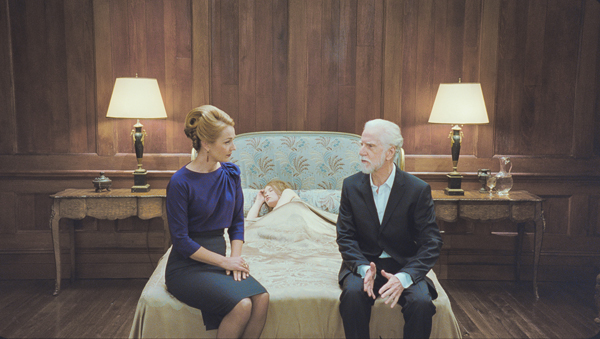
Rachael Blake, left, Emily Browning and Peter Carroll in SLEEPING BEAUTY (Wendy McDougall/IFC Films)
Written & Directed by Julia Leigh
Produced by Jessica Brentnall
Released by IFC Films/Video On Demand
Australia. 101 min. Not Rated
With Emily Browning, Rachael Blake, Ewen Leslie, Peter Carroll & Chris Haywood
In the same year that Catherine Breillat reinterpreted The Sleeping Beauty as a model fairy tale for feminist girls, Australian novelist and debut film writer/director Julia Leigh takes the more radical and daring approach of exploring and exploding its enduring appeal to men. Her Sleeping Beauty is a lot scarier, and definitely not for children.
A beautiful young woman is first seen grounded in mundane reality. College student Lucy (Emily Browning) struggles to make ends meet as a part-time waitress and medical research subject. She manages to find time to tenderly care for a dying friend, but her roommate’s domineering boyfriend first demands she take on more housekeeping duties and then threatens to evict her for rent due. She finds if she puts on a tight dress and tosses her long auburn locks, men will pay for drinks and dinner, and she starts getting more and more reckless in tempting them, and tempting fate.
Scanning the campus newspaper for more opportunities, she responds to an advertisement for “Silver Service.” The imperious procurer, Clara (Rachael Blake), teaches her how to formally conform in barely-there lingerie to old rich men’s (and sometimes couples’) elaborately staged elegant dinners in somewhat stereotyped decadent tableaus. Clara protects Lucy, dressed comparatively modestly in white, when the evenings change from posing to debauchery.
This background all becomes an expository set-up for Leigh to delve into powerful historical and literary images of old men (it’s hard not to call them old goats) seeking warmth (and domination) over completely passive maidens. She was inspired by King David’s predilections in his declining years, and two novellas about specialized brothels, Yasunari Kawabata’s House of the Sleeping Beauties (1961), which was then referenced in Gabriel García Márquez’s A Memory of My Melancholy Whores (2004). But none of these were from the point of view of the young women as the sleeping objects of their obsessions.
Lucy presses Clara for more money, though the madam has warned her against getting hooked on the regular income, and she’s offered a special job. Entering into a mythic recreation via a modern carriage (a limo), Lucy leaves a trail of red berries into an isolated mansion on the edge of a forest. She undergoes elaborate beauty preparation, much like the Biblical Esther undertook to be selected by the Persian King Ahasuerus, before Clara formally drops a magic potion into Lucy’s special tea, leads her to a locked chamber to slumber for the night, and performs the ritual of instructing each nameless client as to the house rules before he joins the young woman in that room—no penetration, but almost anything else goes. The audience watches several excruciating nights, squirming from a static observation point, wondering just how far each Methuselah will go with the naked, living, porcelain doll asleep in his bed. (Browning is fearlessly pliable). Suddenly Leigh throws in an almost sympathetic perspective when the only repeat client (Peter Carroll) delivers a mesmerizing monologue directly to the camera defending his grasping for life.
Outside of this work, Lucy tries, unsuccessfully, to relate to her real world (a brief encounter with a handsome ex-boyfriend provides just a frustrating glimpse of her emotional issues that thwart a happy-ever-after kiss from a potential Prince Charming). To assert control over her life, she rents an expensive apartment to create her own modern fantasy aerie to bring back random hook-ups, but she becomes as curious as Bluebeard’s wife to know what goes on behind closed doors back in the mansion. The very banality of human nature that she discovers may be a letdown, especially about the elderly male variety, but the film feels as disturbingly universal as a modern fairy tale.






Leave A Comment